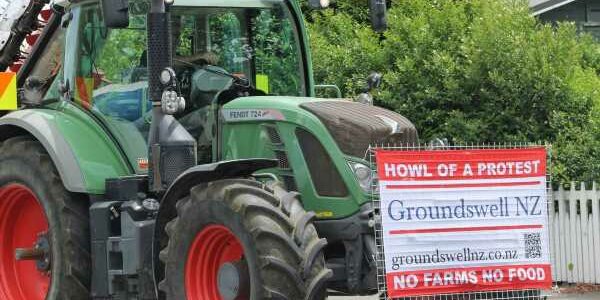
John Roughan: Why I am angry about Aotearoa
John Campbell kept popping up in television to ask, “Why are we so angry?” Good question, I thought. So I tuned in to the promoted programme, thinking he genuinely wanted to find out.
But he didn’t. He talked to a psychologist about anger and to people who had been abused at work by angry people, and told us what he thought about anger, more than once. But the closest he got to angry people was a socially distanced meeting in a field with two amiable farmers who had been among those protesting on tractors in towns and cities this year.
Their rallies have attracted allies with banners against everything from the ute tax to lockdowns and their big march to Parliament shocked reporters because its anger was directed at the media too.
Campbell said he had difficulty getting “Groundswell” to speak to him. But when he did get two of them on camera, he flashed them a placard objecting to calling the country Aotearoa and said to them, “This is just racist horse s***, isn’t it?”
The poor fellows quickly disowned the sign, declared they were not racists and Campbell gave them one of his homilies about how important it was that we understand each other and talk to each other with respect. The pair readily agreed but I don’t think he saw the irony.
I miss Paul Holmes. He knew how to draw out people when their anger seems out of proportion to their issue. Something deeper is usually going on, which they’re afraid to express.
Campbell was probably on to it with that placard. Some people – who knows how many? – feel deeply threatened by constitutional and cultural changes being foisted on the country. But they are being silenced by labels like “racist”, “far right” or “white supremacist”, terms used to marginalise them and avoid publicising their views.
The main reason for the recent anger, obviously, is the pandemic. New Zealand has had the most severe lockdowns of just about any place outside China. I’ve been angry because the restrictions and costs seemed out of proportion to the hospitalisation and fatality rates recorded for Covid-19 on the internet.
The great majority of New Zealanders did not think the restrictions were out of proportion to the risk described to them but they probably were not surprised that by the time Auckland’s four months of isolation ended this week, crowds had been protesting in parks, stopping traffic and angry about nearly everything.
We are not China, as the lenient response to the protests has demonstrated, but our media are no less inclined to suppress views considered socially harmful on one subject in particular. It’s one that goes to the heart of our national identities and democracy.
A post-colonial state is not one nation but two and both should be respected. When I read reports from certain government agencies that now refer to New Zealand only as “Aotearoa”, I feel deprived. But I would bargain this to stop pre-European names becoming alternatives for cities founded by our colonial forebears.
I think it is well past time to challenge this notion that our colonial heritage is entirely regrettable. Colonialism has given us much to celebrate, not least British common law, civil liberties and constitutional institutions. TVNZ’s law-trained news anchor, Simon Dallow, should know better than to be giving Parliament the name of a Wellington backwater.
I agree that the solution to the sorry position of Māori on most social statistics is probably to be found in greater indigenous nationalism and self-government. In fact, I have advocated these many times here. But indigenous nationalism does not need to rename creations of European heritage and self-governance is not “co-governance” of services for all.
Most importantly, these sort of decisions should follow public debate and open negotiation by a Māori political party, not be made within a governing party out of sight, not if they are to survive a change of government.
Inside this government there is a Māori caucus which presumably negotiated the co-governance now proposed for the public health service and “three waters”. We don’t know how these arrangements are supposed to work or how far into state services co-governance might go. There is almost no critical reporting of this aspect.
Worse, objectors believe the media are closed to their views and committed to the causes that worry them. Programmes like Campbell’s do not help. They send angry people to the wild and wacky American websites whose influence appeared in the Groundswell rallies.
Why are we so angry? I suspect it has less to do with what is happening than the way it is happening, with no reference to the general will.
Source: Read Full Article